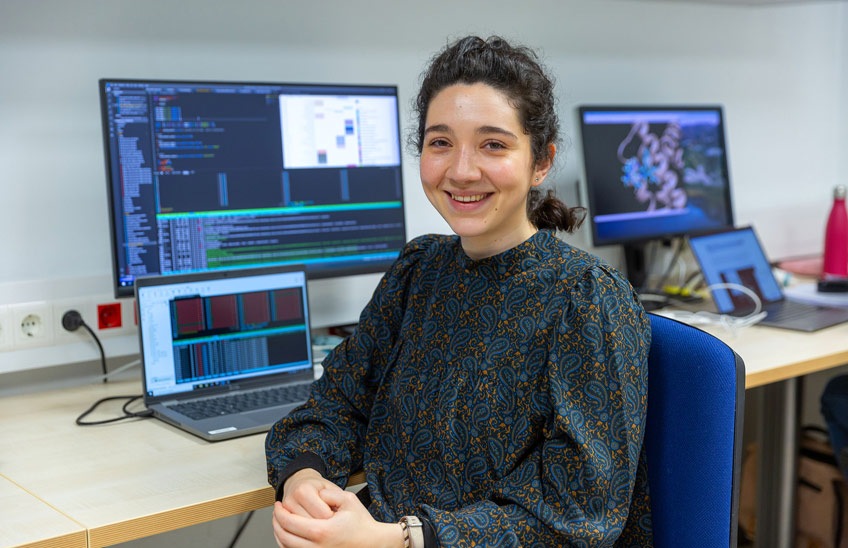Computational methods applied to prostate cancer research
An ongoing research at the University studies gene regulation in metastatic prostate cancer from data analysis

FotoManuel Castells<br>/La investigadora Irene Marín
31 | 03 | 2022
Irene Marín (Pamplona, 26 years old) is Master's Degree in Computational Methods in Science (2021) at the University of Navarra. She is currently doing her doctoral thesis in the Computational Biology programme at the research center Applied Medicine, under the supervision of Dr. Mikel Hernáez and Dr. Liewei Wang(Mayo Clinic - Minnesota).
Marín's research focuses on studying the mechanisms of gene expression in metastatic prostate cancer. "We use computational and artificial intelligence methods to analyse a large number of gene expression data from patient tumour samples. From these data we are able to deduce gene regulatory networks and identify which of them are involved in resistance to treatments.
Therefore, this research brings us closer to a deeper understanding of these cellular mechanisms so that we can select the most appropriate therapies for each patient. "We can identify new therapeutic targets, better select patients in whom therapy with the drug abiraterone may be more effective or accompany it with other drugs that improve the response.
For the moment, according to the researcher, the results obtained in cell lines are consistent with what they predicted computationally. "The idea is to continue with the analysis of the rest of data that we have and expand the information with data of single cells from other programs of study to, in a few months, go to the Mayo Clinic to test the hypotheses generated with programs of study in vivoin xenograft models from patients".
The young woman from Navarre points out that the method applied in her research is used in other different areas "from myelodysplastic syndromes in the oncohaematology area of CIMA to the behaviour of bees".
Master's Degree in Computational Methods in Science
The research that PhD student Irene Marín has started this year is a continuation of the work Fin de Master's Degree (TFM) that she completed last year at the Master's Degree in Computational Methods in Science offered by the academic centre.
During the Master's Degree Marín specialised in bioinformatics because he considers that computing and data analysis have a great future in the field of biomedicine. "We learned to handle data sequencing of high performing, to analyse them and draw conclusions; also to develop models withmachine learningand to simulate, validate and analyse Structures of proteins".
Irene Marín highlighted as differential values of Master's Degree the training internship , the dynamism of the classes, the tools used, and the accessibility of the teachers. "They have given us many tools, but the most important one is the ability to think in order to find the information we need to solve problems autonomously".
The doctoral student added that Master's Degree is a very complete programme in terms of training, offering the possibility of doing the TFM in companies, and in which it is essential to work with the computer. profile "If you come from a background like mine (a graduate in Health Sciences) who would never have considered learning to programme, you like challenges, getting out of your comfort zone and you want to learn, this Master's Degree is perfect".
